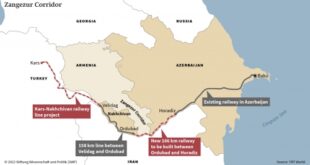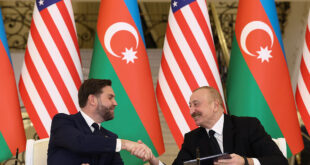 Russia’s military presence in Georgia has unnerved refugees who fled here from Chechnya in the 1990s.
Russia’s military presence in Georgia has unnerved refugees who fled here from Chechnya in the 1990s.
Â
When Russian tanks rolled toward Tbilisi, Georgia, in August, shops closed and streets emptied as residents stayed indoors, glued to their televisions and radios. A hundred miles northeast, in the mountainous enclave of Pankisi Gorge, Chechen refugees also watched Russian troops advancing on TV, but with less stupefaction and more cynicism.
The Russian Army’s five-day invasion over South Ossetia, a breakaway territory in Georgia, reminded them of Russia’s brutal war in Chechnya throughout the 1990s.
Â
“They [the Russians and Ossetians] are talking about genocide, but nobody is talking about the terrible things that happened in Chechnya…. [The Russians] say they fought to protect their citizens, but look what they did to us. We were their citizens, too,” says Musa Dadayev, a refugee in Pankisi since 1999.
Chechnya spent the better half of the 1990s at war with Russia. Like Georgia’s separatist territories, Abkhazia and South Ossetia, it won de facto independence at the end of a gun. But when Russia launched a second frontin 1999 to regain control, it leveled Grozny, Chechnya’s capital, and displaced hundreds of thousands of people. Amnesty International estimates that 25,000 civilians were killed in this war alone.
Â
Four to five thousand refugees spilled over the mountain border into Pankisi Gorge and found sanctuary with fellow Muslim Kisti, ethnic Chechens who had arrived in the Georgian region some 150 years earlier.
Most refugees were women and children, though many guerrillas also used the area as a haven from which to launch operations into Russia By 2003, however, with the help of US military training, Georgia cleared the area of these paramilitary fighters.
Â
When Russian helicopters entered Pankisi airspace in August, many locals had flashbacks of the Chechnya war. Some refugees, like Taus Yerznukayeva, took their families and fled to the Turkish border in a vain attempt to seek asylum. “We were all certain there would be war again,” asserts the mother of nine.
Â
Like nearly all of the 1,102 registered refugees in Pankisi, Ms. Yerznukayeva has no home in Chechnya to return to. Nor does she want her sons to live in Chechnya under the Russian-backed Chechen president, Ramzan Kadyrov, or be conscripted into the army.
Â
Some Chechen refugees and Kisti noted with bitterness the West’s proactive role in negotiating the Russian-Georgian peace process over South Ossetia. France brokered a six-point peace plan with Russia on Aug. 12, which put an end to hostilities. Neither Europe nor the US took a firm stance on the fighting in Chechnya, claiming it was Russia’s internal problem.
Â
Lia Margoshvili, a Kisti widow, believes Western intervention in Chechnya would have kept Russia in check. “If the world had supported Chechnya the way it supported Georgia, there wouldn’t have been a war now,” she declares.
Â
By Paul Rimple
Source: The Christian Science Monitor
Â
Kavkaz Center
 Eurasia Press & News
Eurasia Press & News



